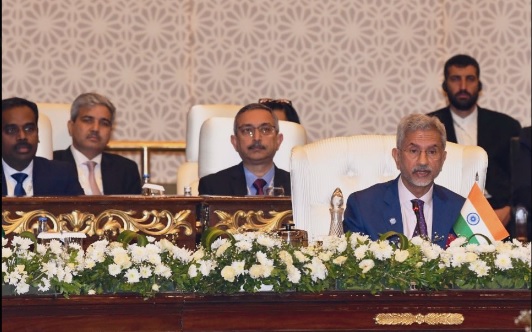Last Updated on October 16, 2024 1:23 pm by INDIAN AWAAZ
Dr. S. Jaishankar delivered India’s National Statement at the SCO Council of Heads of Government Meeting in Islamabad
AMN / WEB DESK / Islamabad
INDIA’S External Affairs Minister S Jaishankar has criticised Pakistan, saying that cross-border extremism and separatism hinder bilateral trade and relations. Speaking at the Shanghai Cooperation Organisation (SCO) summit, Jaishankar said it is hardly likely to help bilateral trade, relations, and other activities.
“It is axiomatic that development and growth requires peace and stability. And as the Charter spelt out, this means being firm and uncompromising in countering the ‘three evils’. If activities across borders are characterised by terrorism, extremism and separatism, they are hardly likely to encourage trade, energy flows, connectivity and people-to-people exchanges in parallel,” Jaishankar said at the ongoing summit in Islamabad.
The External Affairs Minister stressed that SCO’s “primary goal of combatting terrorism, separatism and extremism is even more crucial in current times”. He noted that globalisation and rebalancing are current day realities and SCO countries need to take this forward.
“It requires honest conversation, trust, good neighbourliness and reaffirming commitment to SCO Charter. SCO needs to be firm and uncompromising in countering the ‘three evils’,” he asserted.
Delivering India’s national statement at the summit of SCO Council of Heads of Government meeting, the minister further said, “Cooperation must be based on mutual respect and sovereign equality, recognise territorial integrity and sovereignty and be built on genuine partnerships, not unilateral agendas. SCO cannot progress if we cherry-pick global practices, especially of trade and transit”.
“Industrial cooperation can enhance competitiveness and expand labour markets. MSME collaboration, collaborative connectivity, environmental protection and climate action are possible avenues. Whether it is health, food or energy security, we are clearly better off working together”, he said.
Jaishankar also listed India’s global initiatives and national endeavours toward sustainability and holistic development, which include the International Solar Alliance, Coalition for Disaster Resilient Infrastructure, Mission LiFE which advocates sustainable lifestyle, the promotion of Yoga, Global Biofuel Alliance, International Big Cat Alliance, and similar efforts.
Jaishankar also congratulated Pakistan for its presidency of the SCO summit this year and said India has extended its full support for a successful presidency.
“It is imperative that we now renew our resolve to attain the objectives of the SCO. That means recognizing the current constraints on our cooperation and focusing on the pathway forward. It can surely happen when we develop and implement an agenda that is firmly based on an agreed mutuality of interests. To do that, it is equally essential that we abide by the do’s and don’ts so clearly articulated by the Charter. After all, the SCO represents the forces of change on whom much of the world puts such great store. Let us live up to that responsibility” EAM stressed.
What is SCO?
China, Russia, Pakistan, Kazakhstan, Kyrgyzstan, Tajikistan, Uzbekistan, Belarus, Iran, and India constitute the Eurasian security and political group formed in 2001, while 16 other countries are affiliated as observers or “dialogue partners”.
SCO claims to represent 40% of the world’s population and about 30% of its GDP, but its members have diverse political systems and even open disagreements with one another.
Observers believe the bloc seeks to counter Western influence in the region.

